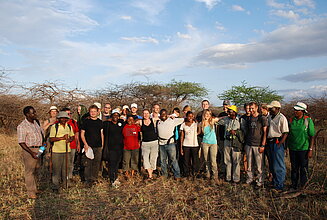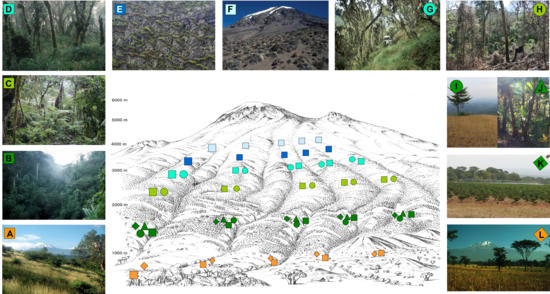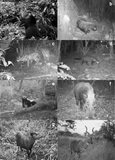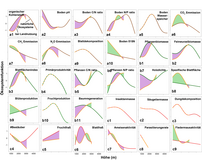Global Change on Kilimanjaro Endangers Biodiversity and Functions
Kilimanjaro is home to many of the world's climatic zones, from tropical savannahs to montane forests and Afroalpine vegetation. The mountain's natural ecosystems harbour a high biodiversity and ensure important ecosystem services such as the provision of water, climate regulation, erosion control, and pollination and pest control in agroforestry systems.
The tenfold increase in population density in recent decades has resulted in large parts of Kilimanjaro now being covered by anthropogenic ecosystems. Climate change in this region is altering average temperatures and resulting in more frequent extreme events.
German-Tanzanian Collaborative Project to Study Global Change on Kilimanjaro
In DFG Research Unit 1246 (KiLi), we investigated the effects of land use and climate on plant and animal biodiversity and numerous ecosystem functions. A total of 60 study sites represent all altitudinal levels and the most important natural and anthropogenic ecosystems (Figure 3). Since 2010, German and Tanzanian scientists have collected the world's most comprehensive dataset on a tropical mountain ecosystem. The research results, the close cooperation and the training of Tanzanian PhD students make an important contribution to knowledge transfer, nature conservation and sustainable land use in Tanzania.
Important Results
Our project showed that land use leads to a serious loss of plant and animal biodiversity. Hot and dry savannah ecosystems are particularly affected (Figure 4). Large mammal species are completely absent from ecosystems used by humans (Figure 5). Climate and land use have led to major changes in ecosystem functions such as nutrient cycling in soils and water, greenhouse gas emissions, carbon sequestration capacity and biotic interactions such as pollination, dung decomposition and seed dispersal (Figure 6,7). Climate change may exacerbate the negative impacts of land use in the future.
Contact & Links

PD Dr. Marcell K. Peters studied biology, geography and palaeontology at RWTH Aachen, JMU Würzburg and RFWU Bonn. In his doctoral thesis in 2008 at the Zoological Research Museum Alexander Koenig, Bonn, he investigated the effects of rainforest fragmentation on insect and bird communities in Kenya. Since 2011, he has been working as a scientist at the Department of Animal Ecology and Tropical Biology at the University of Würzburg, where he is particularly responsible for teaching in the field of tropical ecology. In his research, he investigates the changes in biodiversity and biological processes on tropical mountains, especially on Mount Kilimanjaro in northern Tanzania.

Prof. Dr. Ingolf Steffan-Dewenter has been Professor and Head of the Department of Animal Ecology and Tropical Biology at the University of Würzburg since 2010. Previously, he was Professor of Animal Population Biology at the University of Bayreuth. He studied biology in Karlsruhe, completed his doctorate at the University of Göttingen and habilitated there. He studies the effects of global change on insect biodiversity and biological services such as pollination and pest control. One focus of his research is Africa.
Department of Animal Ecology and Tropical Biology (Zoology III)













